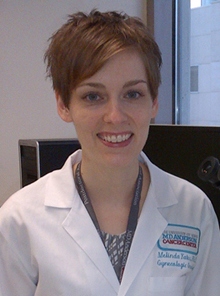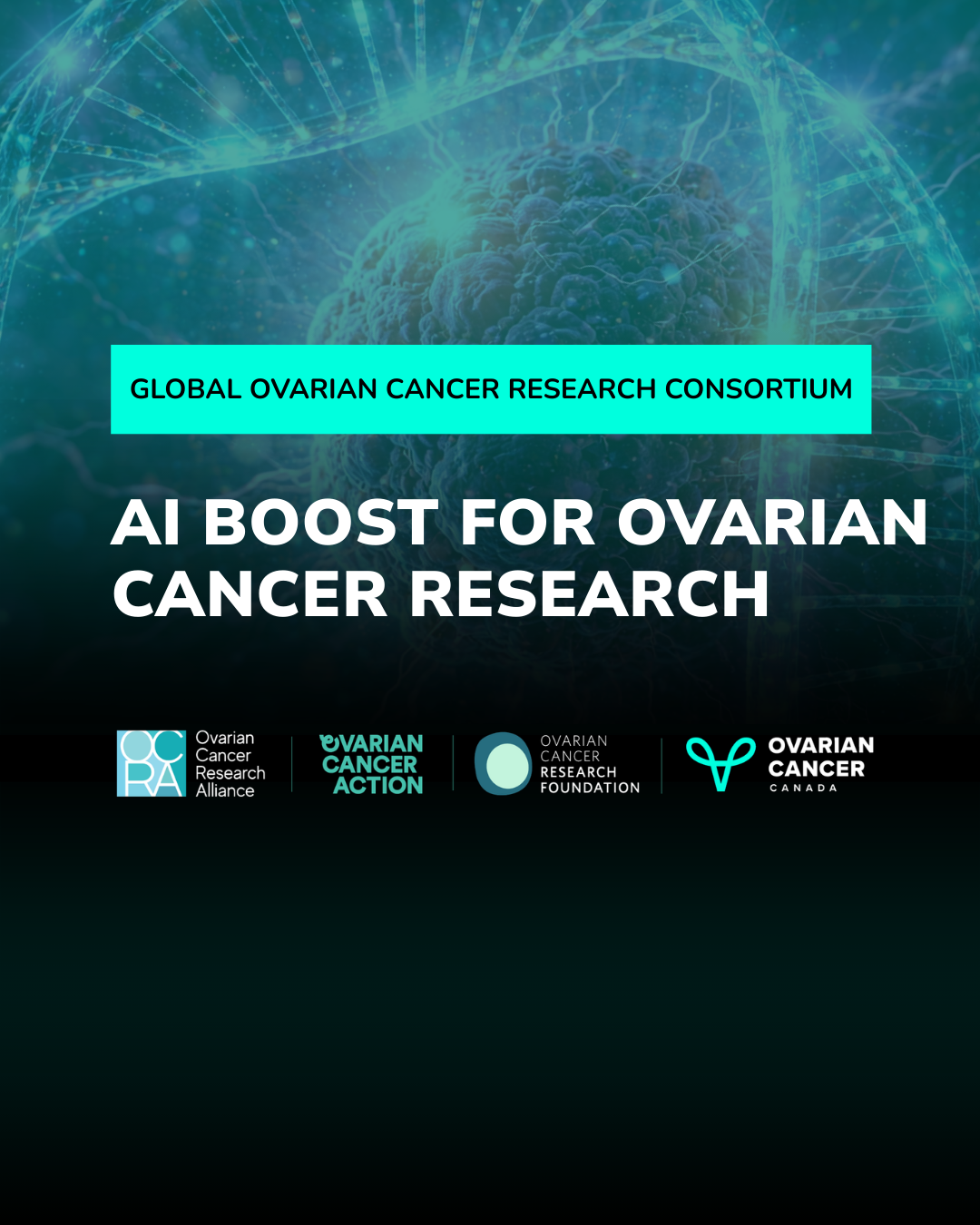
Dr. Melinda Yates is a 2012 Ann Schreiber Program of Excellence Grantee.
In this interview with OCRF’s Sarah DeFeo, Dr. Yates discusses her research and what it means to receive a grant from OCRF.
Sarah DeFeo: Tell us about yourself.
Melinda Yates: I’m originally from a very small town in Indiana that is hours away from even a small city. I grew up with the feeling that there were a lot of exciting things happening in other places and I couldn’t wait to go find out what they were. I have a twin sister who always shared the same feeling and now we enjoy traveling together to see some of those exciting places all over the world. I love music, so I really enjoy going out for a concert or hearing a DJ play music from my favorite genres. I also have a very smart and very adorable dog named Iggy, so I enjoy walking around the neighborhood with him on a beautiful day in Houston (when it isn’t 100 degrees outside)!
SD: Were you interested in science as a child?
MY: I’ve always wanted to be a scientist, though I think there was a brief period when I wanted to be an astronaut too! In my hometown there weren’t any universities or museums, but my mom always made sure we were surrounded by books and she really encouraged my curiosity about the world with whatever tools she could find– books, videos, a chemistry set that I mostly used to create a huge mess, and definitely the Discovery Channel and PBS!
SD: What motivated you to enter ovarian cancer research?
MY: It is very important to me that my work has the goal of helping people. I’ve always wanted to contribute specifically to women’s health issues and I had significant training in cancer biology during graduate school. As I learned more about ovarian cancer and the dismal survival rates, I knew that ovarian cancer research was the perfect way for me to combine my training in cancer biology and my passion for women’s health.
SD: In a nutshell, what is your OCRF research project about?
MY: The goal of my OCRF research project is to better understand the earliest molecular “injuries” that can lead to cancer in the ovaries and fallopian tubes of women at high-risk for cancer due to inherited BRCA1 gene mutations. We are developing a mouse model to study these very early changes and we believe it can help us to identify new ways to prevent ovarian cancer.
SD: What do you like best about your job?
MY: I enjoy science because it satisfies my intellectual curiosity, but I especially love that my research can help people. My research has largely focused on cancer prevention and I love the idea that the knowledge we are gaining might help someone avoid cancer all together! MD Anderson is a great place to help keep our research focused on that goal. Whether you’re entering the building to start work in the morning, walking to the cafeteria for lunch, or crossing our skybridge for a seminar in another building, you are constantly surrounded by cancer patients and their families. It’s impossible to see cancer as an abstract scientific problem; it is a real life-or-death struggle that some people are facing every day.
SD: How will the grant help you?
MY: The OCRF grant will allow me to move my research and my career forward. The transition from postdoctoral fellow to independent investigator requires a significant amount of data and funding to develop a robust research program independently. Ovarian cancer is an under-studied disease, in part because it is an under-funded research area. The OCRF grant gives me the opportunity to focus on doing important and high quality research on a disease that really needs our attention, without having to struggle for funding!
Dr. Melinda S. Yates, Ph.D. is currently a Postdoctoral Fellow in the Department of Gynecologic Oncology and Reproductive Medicine at The University of Texas MD Anderson Cancer Center in Houston, Texas. Dr. Yates completed her Bachelor of Science degree in Chemistry at Purdue University (West Lafayette, Indiana) and her Ph.D. in Pharmacology and Molecular Sciences at Johns Hopkins University School of Medicine (Baltimore, Maryland). Her Ph.D. thesis work focused on using rodent models to develop drugs to prevent cancer (cancer chemoprevention). Her research interests continue to include a strong emphasis on cancer prevention. In her current studies under the mentorship of Dr. Karen H. Lu, M.D., she also maintains a dedication to translating research findings into advances that can improve health outcomes in women at high-risk for ovarian cancer due to inherited mutations in the BRCA1 and BRCA2 genes. Dr. Yates has received numerous awards, including a National Cancer Institute-funded Cancer Prevention Research Training Award at MD Anderson Cancer Center, a National Institutes of Health LRP Grant in Clinical Research, PhRMA Foundation Predoctoral Fellowship in Pharmacology/Toxicology, and multiple Scholar-in-Training Awards from the American Association for Cancer Research.
The grant to Dr. Yates was made possible through the support of Phil and Judy Messing, in memory of Carol S. Messing.


